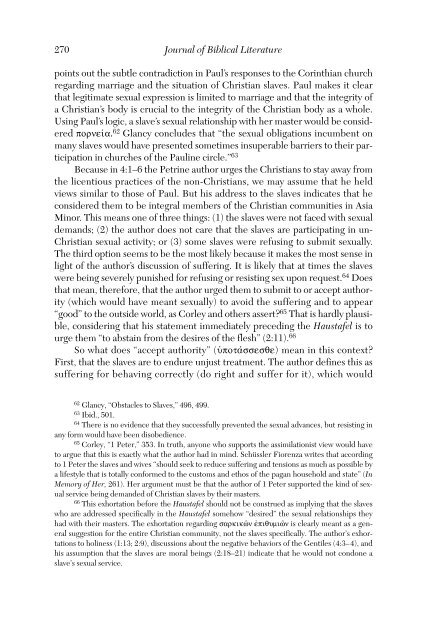Journal of Biblical Literature - Society of Biblical Literature
Journal of Biblical Literature - Society of Biblical Literature
Journal of Biblical Literature - Society of Biblical Literature
Create successful ePaper yourself
Turn your PDF publications into a flip-book with our unique Google optimized e-Paper software.
270<br />
<strong>Journal</strong> <strong>of</strong> <strong>Biblical</strong> <strong>Literature</strong><br />
points out the subtle contradiction in Paul’s responses to the Corinthian church<br />
regarding marriage and the situation <strong>of</strong> Christian slaves. Paul makes it clear<br />
that legitimate sexual expression is limited to marriage and that the integrity <strong>of</strong><br />
a Christian’s body is crucial to the integrity <strong>of</strong> the Christian body as a whole.<br />
Using Paul’s logic, a slave’s sexual relationship with her master would be considered<br />
porneiva. 62 Glancy concludes that “the sexual obligations incumbent on<br />
many slaves would have presented sometimes insuperable barriers to their participation<br />
in churches <strong>of</strong> the Pauline circle.” 63<br />
Because in 4:1–6 the Petrine author urges the Christians to stay away from<br />
the licentious practices <strong>of</strong> the non-Christians, we may assume that he held<br />
views similar to those <strong>of</strong> Paul. But his address to the slaves indicates that he<br />
considered them to be integral members <strong>of</strong> the Christian communities in Asia<br />
Minor. This means one <strong>of</strong> three things: (1) the slaves were not faced with sexual<br />
demands; (2) the author does not care that the slaves are participating in un-<br />
Christian sexual activity; or (3) some slaves were refusing to submit sexually.<br />
The third option seems to be the most likely because it makes the most sense in<br />
light <strong>of</strong> the author’s discussion <strong>of</strong> suffering. It is likely that at times the slaves<br />
were being severely punished for refusing or resisting sex upon request. 64 Does<br />
that mean, therefore, that the author urged them to submit to or accept authority<br />
(which would have meant sexually) to avoid the suffering and to appear<br />
“good” to the outside world, as Corley and others assert? 65 That is hardly plausible,<br />
considering that his statement immediately preceding the Haustafel is to<br />
urge them “to abstain from the desires <strong>of</strong> the flesh” (2:11). 66<br />
So what does “accept authority” (uJpotavssesqe) mean in this context?<br />
First, that the slaves are to endure unjust treatment. The author defines this as<br />
suffering for behaving correctly (do right and suffer for it), which would<br />
62 Glancy, “Obstacles to Slaves,” 496, 499.<br />
63 Ibid., 501.<br />
64 There is no evidence that they successfully prevented the sexual advances, but resisting in<br />
any form would have been disobedience.<br />
65 Corley, “1 Peter,” 353. In truth, anyone who supports the assimilationist view would have<br />
to argue that this is exactly what the author had in mind. Schüssler Fiorenza writes that according<br />
to 1 Peter the slaves and wives “should seek to reduce suffering and tensions as much as possible by<br />
a lifestyle that is totally conformed to the customs and ethos <strong>of</strong> the pagan household and state” (In<br />
Memory <strong>of</strong> Her, 261). Her argument must be that the author <strong>of</strong> 1 Peter supported the kind <strong>of</strong> sexual<br />
service being demanded <strong>of</strong> Christian slaves by their masters.<br />
66 This exhortation before the Haustafel should not be construed as implying that the slaves<br />
who are addressed specifically in the Haustafel somehow “desired” the sexual relationships they<br />
had with their masters. The exhortation regarding sarkikw'n ejpiqumiw'n is clearly meant as a general<br />
suggestion for the entire Christian community, not the slaves specifically. The author’s exhortations<br />
to holiness (1:13; 2:9), discussions about the negative behaviors <strong>of</strong> the Gentiles (4:3–4), and<br />
his assumption that the slaves are moral beings (2:18–21) indicate that he would not condone a<br />
slave’s sexual service.

















